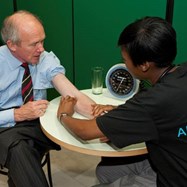The Russell Group welcomes OFFA report outlining our major investment in bursaries and outreach work
24 January 2008
In response to today’s publication by the Office for Fair Access (OFFA) of its monitoring report, Director General of The Russell Group, Dr Wendy Piatt, said:
“The Russell Group welcomes the publication of the monitoring exercise by OFFA which demonstrates the major investment our universities have made in bursaries and outreach work. We are deeply committed to ensuring that talented students from every background receive all the support – financial or otherwise – necessary to benefit from a course at a Russell Group university.
Bursaries
“All our institutions have greatly increased the amount of financial support given to students from low income families through bursaries since the introduction of the new fees regime. The experience of this first year will allow us to build on this excellent start and ensure an even better use of resources in subsequent years.
“OFFA data attests to the enormous efforts Russell Group universities have made to help less well-off students: in 2006-07 the Group spent well over £20 million of additional fee income (AFI) on support for low income students – a greater share of AFI than the sector as a whole and nearly £500,000 more than the sector average per institution.
“A student from a low income background attending a Russell Group university received guaranteed bursarial support of £1,680 on average. This is almost six times the minimum bursary of £300 required by OFFA. In some institutions – e.g. Oxford - guaranteed support was as much as £4,000 for the first year of study. Guaranteed support is supplemented by a large number of schemes targeted at high achieving students or more specific under-represented groups. Eligible students can expect Russell Group university support of some £3,400 per year on average (11 times the OFFA minimum), and up to £5000.
“This provision of support was achieved in the face of substantial challenges: firstly in forecasting the numbers of eligible students despite a lack of accurate data; secondly in identifying eligible students when data protection issues prevented financial details of one in five students from being shared with institutions. To meet this second challenge, our institutions undertook sustained awareness-raising campaigns involving dedicated talks and finance stands at open days and multiple targeted emails and text-messages advising students on their potential eligibility. The University of Manchester received particular commendation from OFFA for its work in this regard.
Outreach
“Bursaries are just one of many key measures designed to overcome the many barriers pupils from ‘non-traditional’ backgrounds face in reaching university. We have dramatically increased the amount of money committed to outreach and widening participation and invested in many new and innovative projects in our determination to improve the socio-economic mix in our student body.
“Funding devoted by Russell Group universities to outreach has grown by nearly £5m since the introduction of variable fees – a commitment to this vital task of over £100,000 more than the sector average per institution. This is in addition to the very large sums already committed to outreach from existing budgets. The University of Oxford, for example, spends over £1.8 million on outreach activities, and the University of Cambridge spends some £3 million on activities aimed at widening participation and access.
“Russell Group universities currently employ well over 100 (full-time equivalent) widening participation staff and offer around 600,000 diverse opportunities annually for students from disadvantaged backgrounds. Much of this resource is devoted to inspiring and informing students – from young children to mature learners – about higher education, encouraging those at school to continue their studies post-16 and facilitating their entry to a course at our universities.
“But universities cannot make headway in raising the proportion of low income students in higher education alone. It is vital that this problem is attacked by several different agencies – particularly by Government, schools and families from an early age. Evidence clearly shows that there are a range of complex socio-economic factors which present barriers to children from poorer backgrounds fulfilling their potential. Outreach work, important though it is, will not solve the problem in isolation from other interventions.
Lessons from Year One
“There can be no room for complacency and our universities are constantly reassessing how best to improve and innovate. The first year of the new bursaries scheme has provided an excellent opportunity to do so. In particular, we are very grateful to Martin Harris and OFFA for their constructive and positive approach and their assistance in helping us in our determined efforts to improve next year.
“Our members have made their bursary schemes simpler and substantially more generous for 2007-8, many making increases well above inflation. This will mean an even larger number of students are eligible for support. By 2010-2011, the value of bursaries and scholarships offered by Russell Group universities in England will be an average of over £5 million per institution per year.
"All of our institutions continue to improve their awareness-raising efforts. Southampton, for example, has just appointed a dedicated student finance outreach officer to maximise up-take of bursaries in subsequent years. King’s College London has organized student focus groups to better understand students’ perspectives on financial support.”
Notes to Editors
- For information on the University of Oxford's bursary programme, see:http://www.admissions.ox.ac.uk/finance/bursaries/
- For information on the University of Manchester’s Advantage Scholarship:http://www.campus.manchester.ac.uk/ssc/funding/undergraduatescholarshipsandbursaries20078/#mas
-
Hamir Patel
hamir.patel@russellgroup.ac.uk
020 3816 1316
-
Hollie Chandler
Hollie.Chandler@russellgroup.ac.uk
020 3816 1307
 X
X


